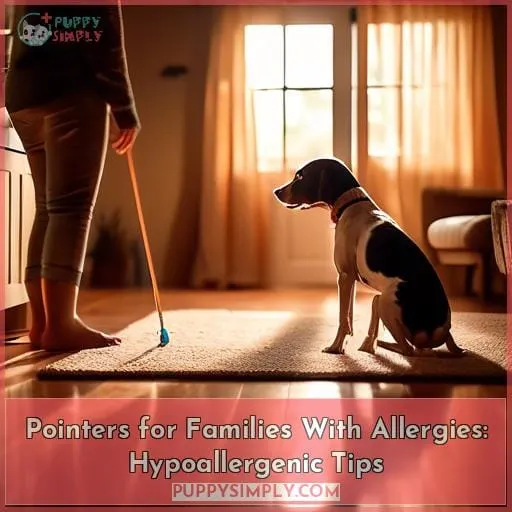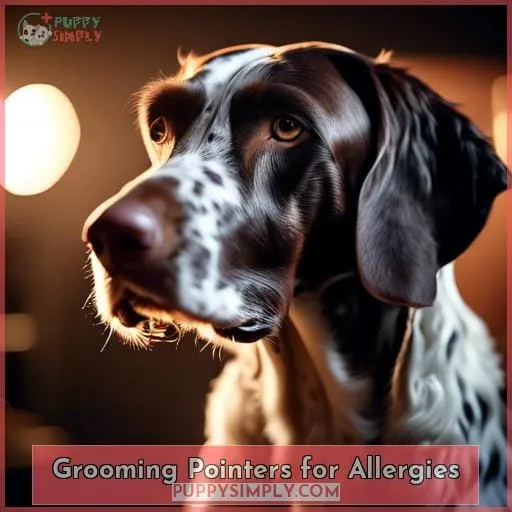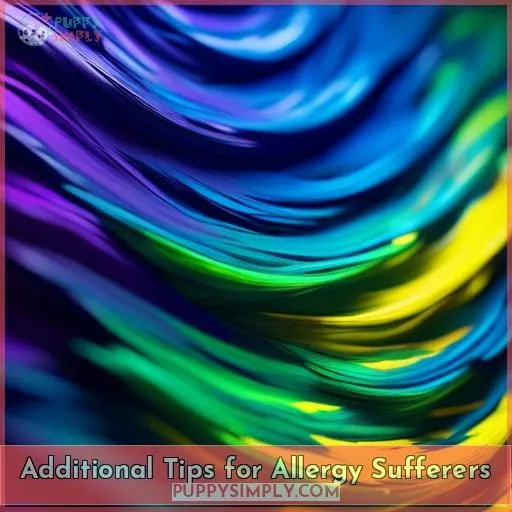This site is supported by our readers. We may earn a commission, at no cost to you, if you purchase through links.
 Navigating the world of dog allergies can feel like a maze.
Navigating the world of dog allergies can feel like a maze.
You’re yearning for the companionship of a Pointer, but those pesky allergies are holding you back.
Fear not, this guide is your beacon.
While no dog is truly hypoallergenic, including Pointers, there are ways to manage and reduce allergens.
From grooming tips to creating a low-allergen environment, we’ll explore strategies to help you and your Pointer coexist harmoniously.
Let’s embark on this journey to understanding Pointers for Families With Allergies: Hypoallergenic Tips.
Table Of Contents
- Key Takeaways
- Understanding Dog Allergies
- Are Pointers Hypoallergenic?
- Grooming Pointers for Allergies
- Living With Dog Allergies
- Creating a Low-Allergen Environment
- Additional Tips for Allergy Sufferers
- Frequently Asked Questions (FAQs)
- Can diet and nutrition play a role in managing a dog’s shedding and dander production?
- Are there any specific cleaning products or home treatments that can neutralize pet allergens effectively?
- How does the presence of other pets in the household impact someone with dog allergies?
- What are the best practices for managing dog allergies in multi-pet households where rehoming is not an option?
- Can regular health check-ups and veterinary care for the dog reduce the severity of allergens in the home environment?
- Conclusion
Key Takeaways
- Pointers are not hypoallergenic, as they have a double coat that sheds regularly, which can cause problems for people with allergies.
- Regular grooming practices, including frequent brushing, bathing with hypoallergenic shampoo, and outdoor grooming, can help minimize the amount of dander and loose fur, thereby reducing allergen exposure.
- Creating a low-allergen environment through regular cleaning, using HEPA filters, and keeping dogs out of certain rooms can also help manage allergies for families with pointers.
- Diet and nutrition play a role in the health of a pointer’s coat and the amount of dander produced, so maintaining a healthy diet for the dog can potentially reduce shedding and dander production.
Understanding Dog Allergies
Let’s start by understanding dog allergies.
They’re caused by proteins in saliva, mucous, and dander.
Dander, made up of dead skin flecks, is a major allergen that gets into the air and environment, triggering reactions in allergy sufferers.
Dog Proteins and Allergies
Sensitivity to dog allergens is a complex interplay between your immune system and the proteins produced by dogs, which can lead to allergic reactions.
Allergen testing can identify specific protein sensitivities, such as Can f 1.
For those sensitive, choosing female companions or neutered options might reduce exposure.
Pointers, though not hypoallergenic, can be part of the solution with the right approach to managing dog allergies.
Dander and Hypoallergenic Dogs
While you may have learned that dog allergies are often triggered by proteins found in their skin, saliva, and urine, it’s important to understand that dander, the tiny flecks of skin shed by all dogs, plays a significant role in allergic reactions.
Although no dog is completely hypoallergenic, some breeds produce less dander and are therefore marketed as more suitable for allergy sufferers.
Are Pointers Hypoallergenic?
You might be wondering, are pointers hypoallergenic?
The short answer is no.
Pointers, including the German Shorthaired and Wirehaired varieties, aren’t hypoallergenic.
They have a double coat that sheds regularly, leaving pet dander in your home, which is the primary cause of pet-related allergies.
However, don’t lose hope if you’re an allergy sufferer who loves pointers.
There are ways to manage allergies and still enjoy the companionship of these energetic dogs.
Let’s explore how.
Pointers and Dander
As you’ve learned about the proteins that cause dog allergies, it’s important to understand that pointers, despite their short fur, aren’t hypoallergenic and do produce dander, a common allergen.
Reducing Dander:
- Frequent brushing, especially outdoors, minimizes loose fur.
Allergy Control:
- Regular baths can help wash away allergens.
Air Purification:
- HEPA filters trap airborne dander particles.
Environmental Management:
- Clean living spaces reduce allergen accumulation.
Allergy Prevention:
- Consider a German Wirehaired Pointer for less shedding.
Pointers and Shedding
Although dander is the primary cause of allergies, shedding can exacerbate the issue as pet hair often carries dander around the home.
When it comes to pointers, you should know that they do shed, albeit at varying levels depending on the specific breed.
To help you understand the shedding patterns and management for pointers, consider the following table:
| Breed | Shedding Frequency | Seasonal Shedding | Management Tips |
|---|---|---|---|
| German Wirehaired Pointer | Moderate year-round | More noticeable in spring and fall | Regular brushing, occasional bathing |
| English Pointer | Minimal | Less pronounced | Occasional brushing to manage shedding |
| German Shorthaired Pointer | Moderate | More during seasonal transitions | Regular grooming to minimize shedding |
| Wirehaired Pointing Griffon | Less than English Pointers | Seasonal shedding present | Maintain with brushing and grooming |
Shedding management for pointers includes regular brushing and bathing, which can help reduce the amount of hair and dander in your environment.
For those with allergies, investing in an air filter and opting for hardwood floors over carpets can also help minimize allergens at home.
Grooming Pointers for Allergies
If you’re managing allergies but want to keep a pointer in your family, grooming is key.
Regularly bathing your dog can help minimize the dander that triggers allergic reactions.
Brushing your pointer outside will also reduce the allergens brought into your home.
Bathing Your Pointer
To maintain your pointer’s coat and minimize allergens, you should bathe them with a hypoallergenic shampoo, focusing on their specific needs.
- Use lukewarm water to avoid skin irritation.
- Gently massage the coat to remove dander and loose fur.
- Proper drying is crucial to prevent skin issues.
- Adhere to frequency recommendations, avoiding over-bathing.
- Post-bath, vacuum to capture any displaced allergens.
Brushing Your Pointer
While brushing your pointer, you’ll not only manage shedding but also distribute natural skin oils throughout their coat, promoting a healthier shine and reducing potential allergens.
Regular maintenance, including grooming techniques that cater to their hunting instincts, is key.
Shedding prevention and coat care are crucial for allergen reduction.
Living With Dog Allergies
If you or a family member suffer from dog allergies, consider spending time with potential breeds before adoption to assess any allergic reactions.
Some breeds, such as Poodles, German Shorthaired Pointers, and Bichon Frises, are known to be more suitable for allergy sufferers.
It’s important to remember that individual reactions can vary, so interacting with the specific breed is recommended to make an informed decision.
Breeds for Allergy Sufferers
Understanding the importance of grooming for managing allergies, you’re now ready to explore specific breeds that are often recommended for allergy sufferers.
Allergy-friendly breeds like Poodles and Schnauzers offer you hypoallergenic dog options.
Embrace pet selection strategies focusing on breeds that align with your lifestyle, ensuring a harmonious home for everyone.
Spending Time With the Dog Before Adoption
Before you finalize the adoption of a pointer, it’s crucial to spend time with the dog to gauge your allergic reactions.
This period allows for:
- Bonding experiences
- Environmental assessment
- Thorough allergy observation
Through interaction evaluation, you’ll understand if your lifestyles mesh, ensuring a seamless compatibility evaluation.
It’s a vital step in finding a furry friend that fits into your life.
Creating a Low-Allergen Environment
Creating a low-allergen environment in your home is crucial if you’re living with dog allergies.
Focus on regular cleaning and dusting to minimize dander and other allergens.
Keep dogs out of certain rooms, like bedrooms, to significantly reduce your exposure to allergens.
Regular Cleaning and Dusting
To maintain a low-allergen environment in your home, it’s essential to integrate regular cleaning and dusting into your routine.
Choose allergen-free furnishings that are easy to clean.
Use pet-friendly cleaning products to eliminate dander.
Invest in air purification systems to filter out allergens.
Consider flooring choices that don’t trap dander, and establish pet-free zones to limit exposure.
Keeping Dogs Out of Certain Rooms
- Building on the importance of regular cleaning and dusting, you’ll find that creating dog-free zones in your home significantly reduces allergen exposure.
- Establishing allergen-free zones, like pet-free bedrooms, is a key step in environmental control.
- Room restriction helps minimize the spread of dander.
Additional Tips for Allergy Sufferers
As an allergy sufferer, you’ll find that managing your symptoms around pointers can be made easier with a few additional steps.
Regular exercise for your pointer is crucial, as it helps to keep their coat healthy and reduces shedding.
Also, don’t forget to trim their nails regularly, as this can help minimize the spread of dander around your home.
Regular Exercise for Pointers
Regular exercise is crucial for Pointers, especially if you’re managing allergies.
A well-exercised dog is generally healthier and may produce fewer allergens.
Engage in outdoor activities and playful exercises to boost your dog’s fitness.
Incorporate training games and energetic playtime into your routine.
These activities not only enhance canine fitness but also strengthen your bond, offering a sense of belonging and freedom.
Regular Trimming of Pointers’ Nails
In addition to ensuring your Pointer gets regular exercise, it’s also crucial that you keep their nails trimmed to maintain their overall health and minimize the spread of allergens.
Untrimmed nails can cause discomfort, lameness, and even injury to your Pointer.
Long nails can also harbor dirt and bacteria, which can be spread throughout your home, exacerbating allergies.
Regular trimming prevents painful tears and splits, keeping your Pointer’s paws healthy.
Use pet-friendly tools designed for trimming dog nails.
Trim nails every 2-3 weeks to prevent them from getting too long.
Frequently Asked Questions (FAQs)
Can diet and nutrition play a role in managing a dog’s shedding and dander production?
Yes, diet and nutrition can influence your dog’s shedding and dander production.
A balanced diet rich in essential nutrients like omega-3 fatty acids, vitamins, and high-quality proteins supports healthy skin and coat, potentially reducing shedding.
Are there any specific cleaning products or home treatments that can neutralize pet allergens effectively?
In the dance of daily life with your four-legged companions,
imagine weaving through a garden of solutions that gently embrace the challenge of pet allergens.
Products like AllerTech® Anti-Allergen Pet Shampoo and Allersearch Pet+ Oatmeal Anti-Allergen Dog Shampoo stand as your allies,
offering a tender touch to neutralize the invisible particles that often lead to sneezes and sniffles.
How does the presence of other pets in the household impact someone with dog allergies?
Having other pets can actually be beneficial for someone with dog allergies.
Exposure to various pets, especially during early life, has been associated with a reduced risk of developing allergies and asthma.
This protective effect is thought to arise from increased exposure to diverse microbes and allergens, which may help in developing a more tolerant immune system.
However, individual reactions can vary, and for some, additional pets might increase allergen exposure.
It’s essential to monitor symptoms closely and consult with an allergist.
What are the best practices for managing dog allergies in multi-pet households where rehoming is not an option?
In a multi-pet household, managing dog allergies involves:
- Regular cleaning and grooming of all pets
- Using HEPA air purifiers
- Creating allergen-free zones
Regularly bathe and brush your dogs to reduce dander and hair. Restrict pets from bedrooms and frequently clean surfaces.
Consult an allergist for personalized advice and potential treatments.
Can regular health check-ups and veterinary care for the dog reduce the severity of allergens in the home environment?
Regular health check-ups and veterinary care can help manage your dog’s allergies, potentially reducing allergens in your home.
A vet might suggest:
- Allergy testing
- Prescribing treatments
- Recommending dietary changes to alleviate symptoms
Conclusion
Imagine breathing freely in your own home,
Cuddling your Pointer without a care in the world.
This dream can be your reality with consistent effort and these expert tips.
Embrace each step,
And you’ll discover the joys of living harmoniously with your beloved Pointer.












